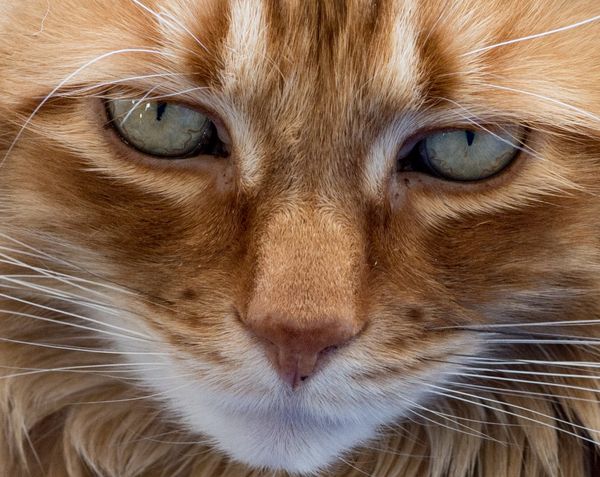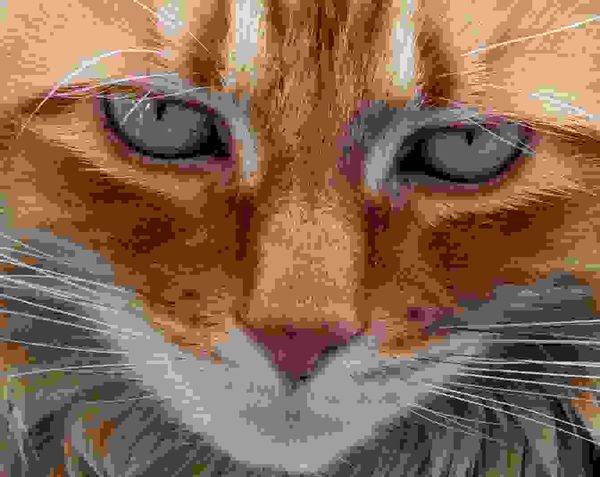Deterioratig jpegs
Dec 22, 2014 11:42:53 #
Hi! I often read that one of the major differences between RAW and jpegs is that the more one opens and edits on jpeg, the more deteriorated the photographic data become. Is it possible to see an example of the repercussions of this situation? I take photos in jpeg and edit in jpeg. I don't see any difference in photos on which I've made a few changes to photos that I've made a hundred changes. Please help me learn. Thanks very much in advance. [Please note that I am not asking about the advantage of editing in RAW, just the question of deterioration of jpegs.]
Dec 22, 2014 11:45:59 #
ediesaul wrote:
Hi! I often read that one of the major difference... (show quote)
Every time a jpeg file is open and then re-saved it is also re-compressed - i.e. loss of more pixels - loss of more detail and less effective editing. It may take time for that all to become visible but it does degrade the image.
Dec 22, 2014 11:58:12 #
ediesaul wrote:
Hi! I often read that one of the major difference... (show quote)
I've not had such an experience on my originals. I never edit then save the original only the edited copy always leaving the original in it's original condition.
It's all digital data, 0's and 1's and that will never change.
I have shots from 2001 that look exactly the same now as they did then so again I say, I've had no such experience.
Dec 22, 2014 12:01:03 #
ediesaul wrote:
Hi! I often read that one of the major difference... (show quote)
Yes, there is a loss from compression when saving as a jpg file. The compression takes place when you save your file. However, you can keep that loss at a minimum by proper configuration of your software. When you 'save as' you need to look at the quality or compression value of your software. If there is a quality selection, you need to set the quality as high as possible, for example, 99%. If there is a loss (compression) factor, you need to set the loss as low as possible, for example, 1%. This will help keep as much info as possible with your file. Have a GREAT DAY!
Dec 22, 2014 12:22:58 #
dugole wrote:
Every time a jpeg file is open and then re-saved it is also re-compressed - i.e. loss of more pixels - loss of more detail and less effective editing. It may take time for that all to become visible but it does degrade the image.
Thanks for your reply. Would you say that the deterioration is important only when one wants to print an enlarged photo? Otherwise, what's the big deal?
Dec 22, 2014 12:23:41 #
dugole wrote:
Every time a jpeg file is open and then re-saved it is also re-compressed - i.e. loss of more pixels - loss of more detail and less effective editing. It may take time for that all to become visible but it does degrade the image.
Due to limited computer power i process all my images as jpeg.
Between my view of the first frame and my post of the finished stack to UHH the image may have been compressed/expanded 8 times.
The degradation is so bad you are lucky to see any detail.
Downsizing and resampling does so much damage that i usually just crop heavily and leave people to guess at what the original looked like.
I envy the power users with their RAW,TIFF, commercial programs and full resolution drop sites
Dec 22, 2014 12:24:59 #
jimmya wrote:
I've not had such an experience on my originals. I never edit then save the original only the edited copy always leaving the original in it's original condition.
It's all digital data, 0's and 1's and that will never change.
I have shots from 2001 that look exactly the same now as they did then so again I say, I've had no such experience.
It's all digital data, 0's and 1's and that will never change.
I have shots from 2001 that look exactly the same now as they did then so again I say, I've had no such experience.
Thanks for replying. I duplicate images that I know in advance I will do a lot of editing on. But, frankly, when I'm working on the duplicate, and opening and closing it, and changing my edits, I don't see any deterioration from the original. So, I'm guessing it's important when one blows up a photo very large in order to print it in a large format.
Dec 22, 2014 12:26:13 #
oldtigger wrote:
Due to limited computer power i process all my images as jpeg.
Between my view of the first frame and my post of the finished stack to UHH the image may have been compressed/expanded 8 times.
The degradation is so bad you are lucky to see any detail.
Downsizing and resampling does so much damage that i usually just crop heavily and leave people to guess at what the original looked like.
I envy the power users with their RAW,TIFF, commercial programs and full resolution drop sites
Between my view of the first frame and my post of the finished stack to UHH the image may have been compressed/expanded 8 times.
The degradation is so bad you are lucky to see any detail.
Downsizing and resampling does so much damage that i usually just crop heavily and leave people to guess at what the original looked like.
I envy the power users with their RAW,TIFF, commercial programs and full resolution drop sites
Thanks for replying. I would love to see you post an original and a jpeg on which you worked many times in order to actually see deterioration.
Dec 22, 2014 12:27:46 #
I'm a proponent of RAW, but there are a million threads on RAW vs jpg so I won't go into that here.
There are several different ways to compress a digital file. Some of them are lossless (no information is discarded) and some are lossy. Jpg has compression built in, so the file is smaller than it would be as a bitmap. The compression method chosen is lossy, but the amount of compression can be adjusted at the time you write (save) the file. More compression gives you smaller files, but more loss of information (artifacts) in the image. The artifacts can be quite visible when the compression is very strong.
Most programs and cameras will use a moderate compression on a jpg file. You will not see large problems in these files even after you re-save them several times. Saving them a hundred times or more may cause some degradation, but the degradation is gradual so unless you compare it to the original file you probably won't notice.
I have attached 2 pictures. The first is a jpg. The second is the same jpg that has been highly compressed. The first jpg is about 350 KBytes and the second is about 50 KBytes. The degradation is obvious. It would take many thousand saves of the first image to make it as bad as the second if you kept the compression moderate. (Please note that this is an extreme example -- you may see more subtle changes).
There are several different ways to compress a digital file. Some of them are lossless (no information is discarded) and some are lossy. Jpg has compression built in, so the file is smaller than it would be as a bitmap. The compression method chosen is lossy, but the amount of compression can be adjusted at the time you write (save) the file. More compression gives you smaller files, but more loss of information (artifacts) in the image. The artifacts can be quite visible when the compression is very strong.
Most programs and cameras will use a moderate compression on a jpg file. You will not see large problems in these files even after you re-save them several times. Saving them a hundred times or more may cause some degradation, but the degradation is gradual so unless you compare it to the original file you probably won't notice.
I have attached 2 pictures. The first is a jpg. The second is the same jpg that has been highly compressed. The first jpg is about 350 KBytes and the second is about 50 KBytes. The degradation is obvious. It would take many thousand saves of the first image to make it as bad as the second if you kept the compression moderate. (Please note that this is an extreme example -- you may see more subtle changes).


Dec 22, 2014 12:27:48 #
pixbyjnjphotos wrote:
Yes, there is a loss from compression when saving ... (show quote)
Thanks for your reply. I would love to see the difference in two posted photos, if possible. have a great day yourself. We have snow showers here in the Capital District of NY.
Dec 22, 2014 12:30:49 #
DirtFarmer wrote:
I'm a proponent of RAW, but there are a million th... (show quote)
Thanks so much for the two downloads. They certainly are different. The second looks likes it overly sharpened. Are you saying that, when I downsize my photos in order to send them by email to friends, my friends will receive photos that look like your second kitty? That has not been my experience.
Dec 22, 2014 12:46:19 #
ediesaul wrote:
Hi! I often read that one of the major difference... (show quote)
I don't think you can edit a RAW and replace it. For example a RAW file from my Panasonic is a .ARW. What ever secret sauce Panasonic uses, it is in no software I have. Editing an .ARW forces the editing work to be saved in some other file.
That said, I think JPEG is an old standard that responded to a need of conserving space. It came from and era where there were no cheap small drives with amazing capacity. So "compression" was important. It is also tangled up in the needs of sending images over limited bandwidth channels.
There is an article on Wikipedia on "JPEG" that is too long to read, but makes it clear that "JPEG uses a lossy form of compression based on the discrete cosine transform".
My brain says that each time the file is saved, more compression may take place. I tried it with a JPEG from a phone of me holding a fish on a day I had not shaved well. After saving it 8 times in Photoshop Elements with "medium" compression, I couldn't see a difference. The file got smaller, but magnified whiskers and fish scales looked the same on my screen. Even with aggressive magnification where the pixels are clearly visible as squares, I see little difference.
My suspicion is that, like everything else related to digital photography, something has changed. In this case I suspect the wizards at Adobe have refined the JPEG file saving antilogarithms in Photoshop Elements in ways that an "old" issue is much less troublesome.
My habits won't change. I will never muck up an important original. I do well enough mucking up copies!
Dec 22, 2014 13:01:53 #
bsprague wrote:
I don't think you can edit a RAW and replace it. ... (show quote)
Thanks for your analysis. I suspect that you are right. I also save originals of photos on which I know I'm going to do a lot of editing....just in case. I edit on duplicates.
Dec 22, 2014 13:04:37 #
ediesaul wrote:
Thanks for replying. I would love to see you post an original and a jpeg on which you worked many times in order to actually see deterioration.
sometimes we shoot ourselves in our own foot.
I've used a keyboard switch and analog data transfer for the past 22 years and considered my monitor view adequate.
a couple weeks ago my computer crashed for the first time in 10+ years and preparing to trash it for an upgrade i removed the switch and extra 6 feet of cable length.
The improvement in quality running straight from computer to monitor was so drastic that i had to do a total re-calibration of the monitor to get a usable image..
Have decided to keep the computer and am considering using the digital outputs available on my video card.
Sometimes we spend all our free time carefully trimming the bushes in front of our homes while ignoring the roots which are cracking our basement walls.
Dec 22, 2014 13:10:19 #
TheDman
Loc: USA
DirtFarmer wrote:
I have attached 2 pictures. The first is a jpg. The second is the same jpg that has been highly compressed. The first jpg is about 350 KBytes and the second is about 50 KBytes. The degradation is obvious. It would take many thousand saves of the first image to make it as bad as the second if you kept the compression moderate. (Please note that this is an extreme example -- you may see more subtle changes).
I have attached 2 pictures. The first is a jpg. The second is the same jpg that has been highly compressed. The first jpg is about 350 KBytes and the second is about 50 KBytes. The degradation is obvious. It would take many thousand saves of the first image to make it as bad as the second if you kept the compression moderate. (Please note that this is an extreme example -- you may see more subtle changes).
Not a great example. Those aren't jpg artifacts. You converted it to a 16 color gif first, then back to jpg, or posterized it.
If you want to reply, then register here. Registration is free and your account is created instantly, so you can post right away.





